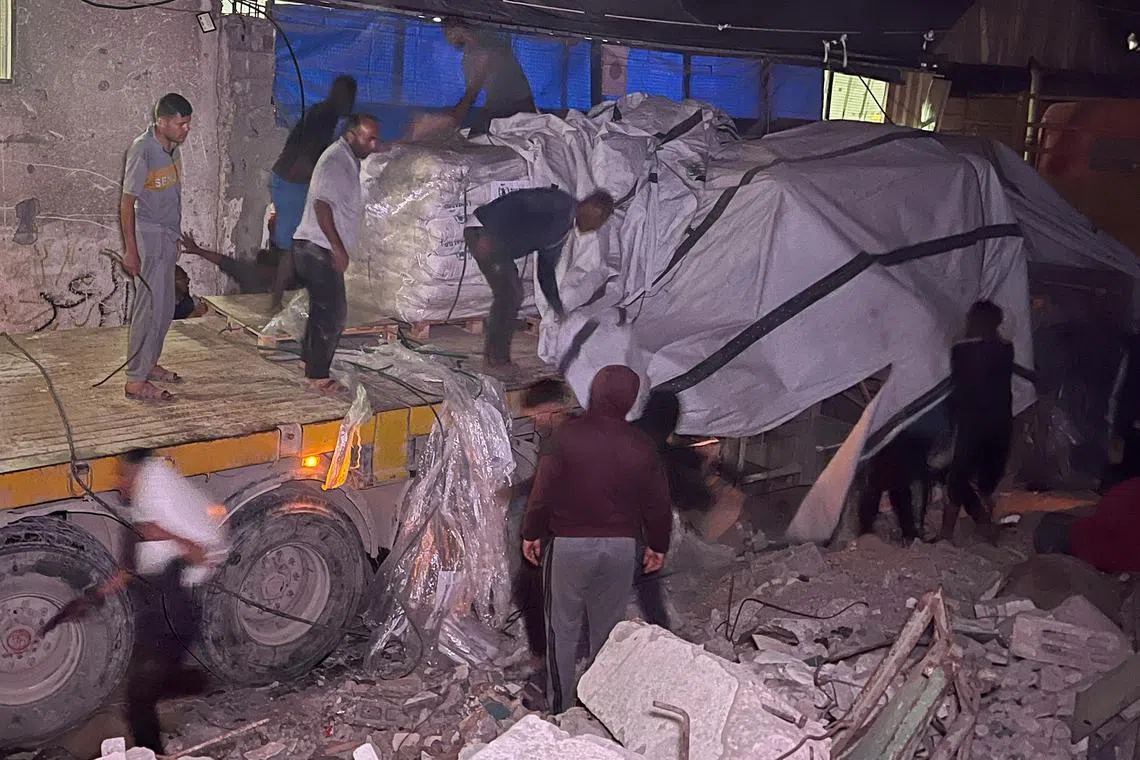UN dispatches around 90 aid trucks into Gaza
Sign up now: Get ST's newsletters delivered to your inbox

Palestinian workers unloading sacks of flour from an aid truck at a bakery in Khan Younis in Gaza on May 21.
PHOTO: REUTERS
GAZA CITY - The UN said on May 21 that it had “dispatched” around 90 trucks carrying aid into Gaza, as international pressure intensified over Israel’s renewed offensive and blockade of the war-ravaged Palestinian territory.
The first aid distribution in Gaza since early March came as Israeli Prime Minister Benjamin Netanyahu said he was open to a “temporary ceasefire”, but reaffirmed that the military aimed to bring the entire territory under its control.
Three days after Israel announced it would allow in limited aid, the UN “collected around 90 truckloads of goods from the Kerem Shalom crossing and dispatched them into Gaza”, said Mr Stephane Dujarric, spokesman for UN chief Antonio Guterres.
The development came hours after Israeli troops fired what the military called “warning shots” near a delegation of foreign diplomats visiting the occupied West Bank, triggering global condemnation.
In Gaza, the Hamas government media office reported the arrival of 87 aid trucks, which it said were allocated to international and local organisations to meet “urgent humanitarian needs”.
Mr Netanyahu said it was necessary to “avoid a humanitarian crisis in order to preserve our freedom of operational action” in Gaza.
Palestinians have been scrambling for basic supplies after weeks of near-total isolation, with Israel’s blockade leading to critical food and medicine shortages.
Israel has, meanwhile, kept up its bombardment, with Gaza’s Health Ministry reporting on May 21 that the bodies of 82 people were taken to hospitals across the territory over the previous 24 hours.
“Barely” one daily meal
Ms Umm Talal al-Masri, 53, a displaced Palestinian in Gaza City, described the situation as “unbearable”.
“No one is distributing anything to us. Everyone is waiting for aid, but we haven’t received anything,” she said.
“We’re grinding lentils and pasta to make some loaves of bread, and we barely manage to prepare one meal a day.”
Humanitarian groups have said that the amount received falls far short of what is required to ease the crisis.
A US-backed private group, the Gaza Humanitarian Foundation (GHF), which will use contractors, said, meanwhile, that it will start moving aid into the territory in “coming days”. The UN and traditional agencies have said they will not cooperate with the foundation, which some have accused of working with Israel.
The GHF has said it will distribute some 300 million meals in its first 90 days of operation.
Pressure on Israel
The army stepped up its offensive at the weekend, vowing to defeat Gaza’s Hamas rulers, whose Oct 7, 2023, attack on Israel triggered the war.
Israel has faced mounting pressure, including from traditional allies, to halt its expanded offensive and allow aid into Gaza.
EU foreign ministers agreed on May 20 to review the bloc’s cooperation accord, which includes trade, with Israel.
Israel’s Foreign Ministry has said the EU action “reflects a total misunderstanding of the complex reality Israel is facing”.
Sweden said it would press the 27-nation bloc to impose sanctions on Israeli ministers, while Britain suspended free-trade negotiations with Israel and summoned the Israeli ambassador.
Pope Leo XIV described the situation in Gaza as “worrying and painful”, and called for “the entry of sufficient humanitarian aid”.
Germany defended a key EU-Israel cooperation deal as “an important forum that we must use in order to discuss critical questions” over the situation in Gaza.
In Gaza, Israel resumed its operations across the territory on March 18, ending a two-month ceasefire.
Hamas’ October 2023 attack resulted in the deaths of 1,218 people in Israel, mostly civilians, according to an AFP tally based on official figures.
Militants also took 251 hostages, 57 of whom remain in Gaza including 34 the military says are dead.
Mr Netanyahu said Israel would be ready “if there is an option for a temporary ceasefire to free hostages”, noting that at least 20 held by Hamas and its allies were still believed to be alive.
Gaza’s Health Ministry said on May 20 that at least 3,509 people have been killed since Israel resumed strikes on March 18, taking the war’s overall toll to 53,655.
In neighbouring Lebanon, the authorities said Israeli strikes killed three people on May 21 as Israel said it targeted Hamas’ allies Hezbollah in the south – the latest in a series of attacks despite a ceasefire with the Iran-backed militant group. AFP


